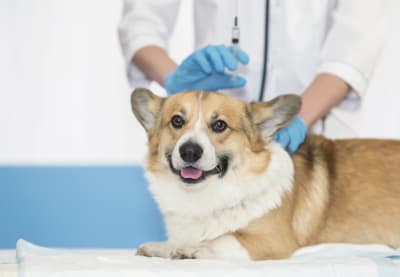Viruses, illnesses and infections can spread quickly from your dog to others. Our Clemmons veterinarians explain three contagious diseases and what to do if you think your pet may be showing symptoms associated with one.
What do my dog's symptoms mean?
As dog parents, it is critical to understand that some of the most common illnesses are also the most contagious. Here, our Clemmons vets review three very common and very contagious ailments — and what you should do if your dog is experiencing symptoms of them.
Parvovirus
Parvovirus is extremely contagious and often fatal. It's a viral disease that is transmitted through contact with a feces from infected dogs.
Symptoms of parvovirus include, but aren't limited to, bloody diarrhea, loss of appetite, frequent severe vomiting, dehydration and lethargic behavior. The virus can live for months, surviving on even inanimate objects — and it can spread to humans, too.
The best way to combat a potential parvovirus infection is through regular vaccination, particularly when a dog is still a puppy. Parvovirus currently can't be killed by available drugs.
Should your dog display any of these symptoms, please contact your vet immediately.
Kennel Cough
Does it sound like your dog is honking while coughing? That could be a sign of kennel cough, which is a form of bronchitis.
Like a chest cold for humans, symptoms can include a dry or hacking cough, sometimes with accompanying phlegm or nasal discharge. Kennel cough can also lead to fever and, in serious cases, pneumonia.
While kennel cough usually clears up on its own, it's very contagious for other dogs your pet may come in contact with. If these symptoms match your dog's, immediately isolate him or her from other animals and contact your vet.
Ringworm
Despite the name, ringworm isn't a parasite like heartworm or tapeworm It's actually a highly contagious fungus that affects your dog's skin and spreads quickly in areas with lots of dogs close together.
Some of the most common symptoms of a ringworm infection are lesions and patchy, red spots in your dog's coat. However, a dog can also carry ringworm with no visible symptoms at all.
Ringworm doesn't just affect your pets, though — it can also spread to humans. If you think your dog might be experiencing a skin problem, it's important to see your vet for an accurate diagnosis and treatment.
Contagious diseases can be a serious problem for you and your pet. If you think your dog may be sick, contact our Clemmons clinic animal today to book an appointment.
Looking for a vet in
Clemmons?
We're always accepting new patients, so contact our veterinary hospital today to book your pet's first appointment.
Related Articles View All
Grooming Anxiety in Dogs - Tips to Calm Your Anxious Dog
Does your dog become anxious and scared when it comes to grooming time? Here, you will find helpful tips to soothe your dog's nerves and make a trip to the groomer a happy adventure.
Checklist for a Successful First Vet Visit for Your Puppy
It's your puppy's first vet visit. What do you need to bring? What happens at a puppy appointment? Today, we provide tips to help make your puppy's first vet visit successful.
What to Do About Diarrhea in Dogs
Dog diarrhea is a messy problem most pet parents find themselves dealing with at some point. So, what causes diarrhea in dogs and how can you stop it? Read on to find out.
Kitten First Vet Visit - What to Expect & What it Will Cost
Have you welcomed a beautiful new kitten into your heart and home? If so, early veterinary care can help to set your tiny fur baby on the path to excellent life-long health. Today, our Clemmons vets discuss kitten first vet visits.
What Should You Do if Your Dog is Losing Their Hair?
Is your dog experiencing patchy hair loss, bald patches, or all-over thinning of the coat? Could be allergies, seasonal shedding, or more severe conditions such as alopecia. Our Clemmons vets delve into the topic of dog hair loss in dogs and what to do.

